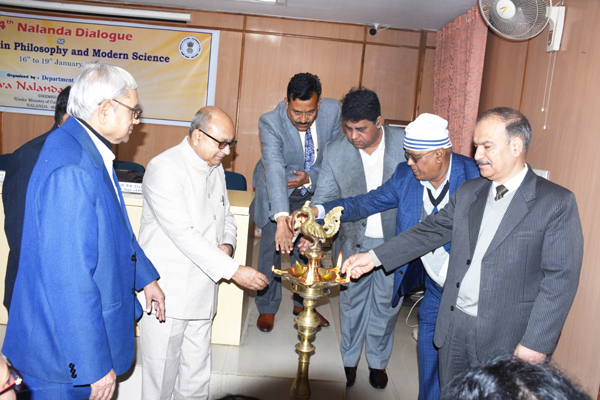 Early Times Report Early Times Report
Jammu, Jan 29: Prof Manoj Dhar,Vice Chancellor, University of Jammu chaired 14th Nalanda Dialogue series on the topic “Causality in Philosophy and Modern Science” held at Nava NalandaMahavihara, University, Bihar.
In his inaugural address, Prof Dhar said that it is matter of great pride and pleasure that he has come to the place which has once been the ancient global seat of learning, extremely well-planned premises that housed more than 10,000 students. The students,scholars and academic community should be encouraged to visit the site and be apprised about the importance and the historical perceptive of this place and which will surely help to develop the Nava NalandaMahavihara as an international centre of excellence.
Prof Dhar said that causality in its most generic sense may be understood as an abstraction that indicates how world progresses, such a basic concept that it appeared more to be an explanation of other concepts than as something to be explained by other more basic. Furthermore, the concept of causation has emerged in Pre-Socratic philosophy, it was probably Plato who first stated the principle of causality: "every¬thing that becomes or changes must do so owing to some cause; for nothing can come to be without a cause." “In western philosophy and metaphysics, the concept has been discussed in all its ramifications right from 450 BC when Lefkipos gave the complete statement of causation as a scientific principle and defined all phenomena as derived from existing causes,” he further added.
However, the idea that causation involves determinism does not have a scientific origin, but a theological one. In spite of differences in detail, the arguments for determinism in the writings of Des¬cartes, Hobbes, Spinoza and Leibniz, are very similar. In no case did the conclusion that all things are determined receive its justifica¬tion from a concern with empirical fact, exhorted Prof Dhar. Prof Dhar further contemplated that the rationalist conception of cause, the relationship between cause and effect is a logical relation. Necessitation involves implica¬tion. Thus, a complete knowledge of the causes is tantamount to knowing the premises from which by reasoning alone the effects can be deduced.
Prof R.C Sinha, Chairman, Indian Council of Philosophical Research, Delhi was the guest of honour on the occasion. |
